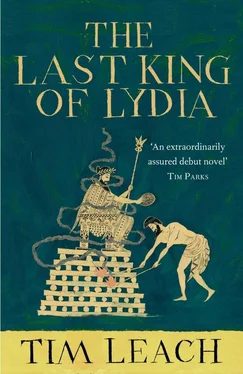Tim Leach - The Last King of Lydia
Здесь есть возможность читать онлайн «Tim Leach - The Last King of Lydia» весь текст электронной книги совершенно бесплатно (целиком полную версию без сокращений). В некоторых случаях можно слушать аудио, скачать через торрент в формате fb2 и присутствует краткое содержание. Год выпуска: 2013, ISBN: 2013, Издательство: Atlantic Books Ltd, Жанр: Исторические приключения, на английском языке. Описание произведения, (предисловие) а так же отзывы посетителей доступны на портале библиотеки ЛибКат.
- Название:The Last King of Lydia
- Автор:
- Издательство:Atlantic Books Ltd
- Жанр:
- Год:2013
- ISBN:9780857899200
- Рейтинг книги:5 / 5. Голосов: 1
-
Избранное:Добавить в избранное
- Отзывы:
-
Ваша оценка:
- 100
- 1
- 2
- 3
- 4
- 5
The Last King of Lydia: краткое содержание, описание и аннотация
Предлагаем к чтению аннотацию, описание, краткое содержание или предисловие (зависит от того, что написал сам автор книги «The Last King of Lydia»). Если вы не нашли необходимую информацию о книге — напишите в комментариях, мы постараемся отыскать её.
The Last King of Lydia — читать онлайн бесплатно полную книгу (весь текст) целиком
Ниже представлен текст книги, разбитый по страницам. Система сохранения места последней прочитанной страницы, позволяет с удобством читать онлайн бесплатно книгу «The Last King of Lydia», без необходимости каждый раз заново искать на чём Вы остановились. Поставьте закладку, и сможете в любой момент перейти на страницу, на которой закончили чтение.
Интервал:
Закладка:
It was unacceptable, one man said, for the Persians to rule an empire. The Hellenes to the west could be bargained with and understood — they were a civilized people. But there was no negotiating with the Persians. Who knew how they would use their new-found power?
Others of the council were unconvinced by the case for war. Sandanis, the commander of the army, was the leader of this faction. An old man now, with the loose-skinned and weary features of a soldier who had spent a lifetime fighting enemies abroad and politicians at home, he had led the army even in the days of Croesus’s father. Repeatedly and forcefully, he argued that Lydia had grown strong through trade and good governance; why risk it all on war with the East? What did events so far away have to do with the Lydian empire?
It was only after the discussion had continued for some time, growing increasingly heated, that the men around the table realized that the king had yet to speak.
One by one, they fell silent and turned to face their ruler. ‘Forgive us,’ said one of the young noblemen. ‘We have spoken at great length, and not waited to hear you, as we should have done.’ He coughed apologetically. ‘What, may we ask, do you think?’
What did he think? Croesus almost laughed. How could so grave a decision be made on the basis of doubt and suspicion, but nothing more? He could feel the excitement around the table at the thought of war, but he found himself unmoved by it. It mattered little to him who ruled over the lands to the east — Astyages had been his brother king in name only. Given a little more time, another year or so, he believed he would find the right way to use his wealth.
And yet, for all this, when he came to speak, he could not find the words for peace. ‘I thank you all for your counsel,’ he said. ‘What an embarrassment of riches you have given me; enough to put those of my treasuries to shame!’ Laughter broke out around the table. ‘I have no hunger for war,’ Croesus continued, the words coming easily now, ‘but will the Persian be satisfied with his new-won kingdom? I think not.’ He looked across at Sandanis. ‘Do not worry,’ Croesus said. ‘I will not be rash. We shall consult with the oracles, and with our allies. I have detained you all too long from your own affairs.’ He gestured towards the door. ‘You may leave.’
The king drummed his fingers on the marble table, smiling and nodding as each of the noblemen departed the council chamber. He sat in silence for a time after they had gone. He turned to Isocrates.
‘Your thoughts?’ Croesus said.
‘Of war with Persia?’
Croesus shook his head, and nodded at the empty chairs. ‘Of them.’
Isocrates shrugged. ‘Divided. They will follow where you lead.’
‘Yes. Or where the Gods lead.’
‘That is true, master.’
‘We must have a prophecy to guide us. To which of the oracles should we turn? Abae?’
‘The prophet at Abae is a stubborn old man, master. He doesn’t like foreigners. If you were a Hellene, I might recommend it, but as a Lydian. .’
‘Ah. That is unfortunate. You know much of these matters?’
‘I rely on the opinions of men who are wiser than I, master.’
‘Well, what do these wiser men have to say of Dodona?’
‘I have yet to hear him give a favourable word for war. He lost both his sons in battle many years ago.’ Isocrates hesitated for a moment. ‘He would give you a prophecy to prevent a war, not to begin one.’
‘What about Ammon, in Libya? Astyages always swore by him.’
‘I wouldn’t trust a Libyan on a matter like this.’
‘Prejudice from you, Isocrates?’
‘Forgive me, master. But I think prophecy is a matter best left to the Hellenes.’
‘Perhaps you are right. Look at what happened to Astyages, after all. I imagine you have objections to Trophonius at Lebadaea as well?’
‘Athens has bought him out. He will not give a good word to any other city or nation.’
‘Well, it appears our choice is made for us. Delphi it is.’
‘The Pythia does give the best prophecies.’ He tried to smile. ‘I hesitate to say it, to you of all people, master, but you know it will cost you dearly?’
‘Do not be concerned with that. What else needs to be done?’
Isocrates thought for a moment. ‘We will need to offer a reason,’ he said. ‘As to why we’ve favoured Delphi, over the others.’
‘Their feelings will be hurt? I wouldn’t have thought they would be so sensitive.’
‘It doesn’t pay to anger a priest. They don’t mind if gods ignore them. Just when men do.’
‘Very well,’ Croesus smiled. ‘Make something up, will you?’
‘Me, master?’
‘Who else? Use your imagination. I’m sure you’ll come up with something fitting.’
The story spread quickly.
None could say exactly where it had come from. Some said it had begun at the dining tables of Lydian high society, where a noble close to the heart of the palace had first told the story to impress another man’s wife. Others claimed that it was first told in the market squares of the lower city, where the storytellers had gathered to share the rumours of the day. It seemed to appear in many different places at the same moment, as though it were some singular vision that the entire city had dreamed together.
First, the story said, the messengers left the city. None who listened to the tale had mentioned these messengers before, and yet now everyone seemed to remember watching them go, a dozen riders heading from the city half a year earlier, each with two horses, each bearing the mark of a king’s messenger. The more men spoke, the more they found themselves agreeing on what these men had looked like, what they had worn, how well they had ridden their mounts.
The messengers left the city together, riding west to Smyrna. There, so the storytellers said, the group divided, one man taking a ship south towards Ammon, the others sailing west to Hellas. These divided again as soon as they touched the shore, scattering across the land, to Abae, Dodona, Lebadaea, and Delphi. They each came to the oracles with gold enough to ask a simple question, but they did not seek the favour of the Gods at once. They waited, counting the days carefully. They waited for the date on which they had all agreed.
A hundred days after their departure, the messengers went in supplication to the prophets and asked the same question of them all. A simple question that did not request that the Gods bless a union, end a feud, save a blighted crop, or otherwise shape the fate of nations. They only desired to know what was it that Croesus, king of Lydia, might be doing at that moment.
On the hundredth day, as this question was being asked in half a dozen different places on the other side of the world, Croesus retired to his chambers, dismissing every courtier and slave who tried to accompany him. Alone, he lit the coals beneath a bronze mixing bowl and poured oil into it. He cracked the shell of a tortoise and cut the meat into pieces. He skinned and gutted a small lamb and, for hours, he mixed the strange, alien stew together. When it was done, he offered the greater portion to the Gods and ate the rest himself.
Each of the oracles responded in their own way. Most spoke in riddles, metaphor and myth. Only one was different, and soon, the words from Delphi, from the Pythia on her sacred tripod, were repeated in every corner of Sardis.
I know the number of grains of sand and the measure of the sea,
I understand the mute and hear the speechless.
Into the depth of my senses has come the scent of hard-shelled tortoise
Boiling in bronze with the meat of a lamb,
Laid upon bronze below, covered by bronze above.
The messengers could not have offered bribes for this information, for they had not known what Croesus would do. Only Croesus and the Gods had known. Croesus, the Gods, and the priestess of Delphi.
Читать дальшеИнтервал:
Закладка:
Похожие книги на «The Last King of Lydia»
Представляем Вашему вниманию похожие книги на «The Last King of Lydia» списком для выбора. Мы отобрали схожую по названию и смыслу литературу в надежде предоставить читателям больше вариантов отыскать новые, интересные, ещё непрочитанные произведения.
Обсуждение, отзывы о книге «The Last King of Lydia» и просто собственные мнения читателей. Оставьте ваши комментарии, напишите, что Вы думаете о произведении, его смысле или главных героях. Укажите что конкретно понравилось, а что нет, и почему Вы так считаете.












